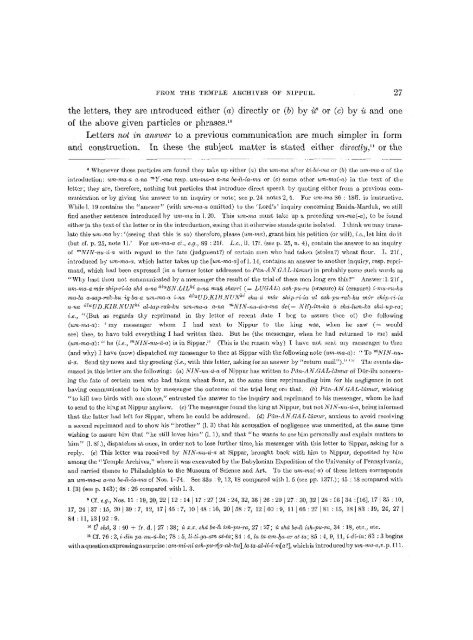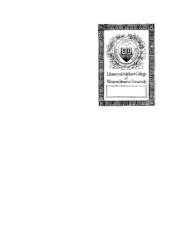THE BABYLONIAN EXPEDITION
THE BABYLONIAN EXPEDITION
THE BABYLONIAN EXPEDITION
You also want an ePaper? Increase the reach of your titles
YUMPU automatically turns print PDFs into web optimized ePapers that Google loves.
FROM <strong>THE</strong> TEMPLE ARCHIVES OF NIPPUII. 27<br />
the letters, they are introduced either (a) directly or (b) by do or (c) by .ic and one<br />
of the above given particles or phrases.I0<br />
Letters not in answer to a previous communication are much simpler in form<br />
and construction. In these the subject matter is stated either directly," or the<br />
~~ ~ ~~ ~-<br />
Whcnever these pmticles are found they take up either (a) tlie urn-ma after ki-bLi-?~~a or (6) tlie urn-.ma-a of the<br />
introduction: urn-ma-a a-ne mY.-ma rap, urn-ma-a a-nu be-li-ia-nin or (c) some other um-inn(-a) in the text of the<br />
lettcr; tliey are, therefore, nothing but particles that introduce direct speech by quuting eitlicr from a previous communication<br />
or hy giving tile answer to an inquiry or note; sce p. 24 notes2, 4. For um-ma 86 : 1Sff. is instructive.<br />
Wllile 1. 19 contains tlic "answer" (with um-ma-a omitted) tu the 'Lord's' inquiry concerrdng Ernidn-Marduk, wc still<br />
find another sentence introduced hy urn-ma in 1.20. Tllis urn-n~n lriust tako up H, preceding um-ma(-a), to bc fuund<br />
either in tlic text of the letter or in the introduction, seeing that it othorwisc stands quite isolated I think we IWCL~ translate<br />
thiaum-ma by: '(seeing that this is so) therefore, please (um-ma), grant lriln his petition (or will), i e., let him do it<br />
(but ci. p. 25, note I).' For unz-mu-a cf., r.g., 89 : 2lf. L.c., 11. 17f. (seep. 25, n. 4), cotltaiin theanswer to nit inquiry<br />
of ".VIN-nu-ti-a with regard to tlic into (judgn~ent?) of ccrtair~ rnrn who had tahen (stolen?) wlicat flour. 1,. 21f.,<br />
introduced by urn-ma-a. 1vhic11 Iattcr takes up tlle [urn-ma-a] uf 1. 14, contains nn answer to anothcr inquiry, resp. reprimand,<br />
which liad been exprcsscd (in s former lcttcr addressed to Pd~~-AN.G.iL-lli7nw) in probably some sue11 wonls as<br />
"Why haet tllou not conlrnunieated by a messenger the result of the trial of these lncn long ere this? Answer: I. 21f,<br />
um-ma-a mar ship-ri-in sh6 a-na ""EINLIL~~ a-nn rnuh sharri (= LUGAL) ash-pu-ru (erasure) Iri (erasure) i-nru-nt-ku.<br />
ma-la a-sap-rak-ku ip-ba-a uni-ma-a i-na G 1 u ~ ~ . ~ i ~ shu-Li l ~ . N mdr ~ ~ ship-ri-ia k i ul ash-pu-ralc-ku m6r ship-ri-ia<br />
a-na "l"~~.K~U.N~~\~ki al-tap-rak-lcu um-ma-a a-na "NIN-nu-d-a-ma de(= A'/$)-im-ka li shii-lum-ka shii-up-ra;<br />
i.e., "(But as regards thy reprimand in thy lettcr af recent date I bcg to assure thco of) the following<br />
(urn-ma-a): 'my messenger whom I had sent to Nippnv to tlie king was, wllen he saw (= would<br />
sce) thee, to hsvc told cvcrything I l id written thcc. But he (tht: mcsscnger, wllrn he had returned to mc) stid<br />
(um-ma-a): " he (i.c., "NIN-nu-d-a) is in Sippar," (This is tile rcason why) I have not sent my mcssenger to thee<br />
(and why) I have (*low) dispatched my mcssenger to thee st Sippnr with the followi~~gnote (urn-ma-a): "To "NIN-nu-<br />
6-a. Sc:ld thy news and thy greeting (i.e., will1 this letter, =king ior an answer by "return nail")!' "' The events discussed<br />
in this letter are the fallowing: (a) NIN-nu-Li-a of Nippur has written tu Pan-AlV.GAL-larnur of Dlir-ilu concerning<br />
tho fate of certain Inen who had tsl

















